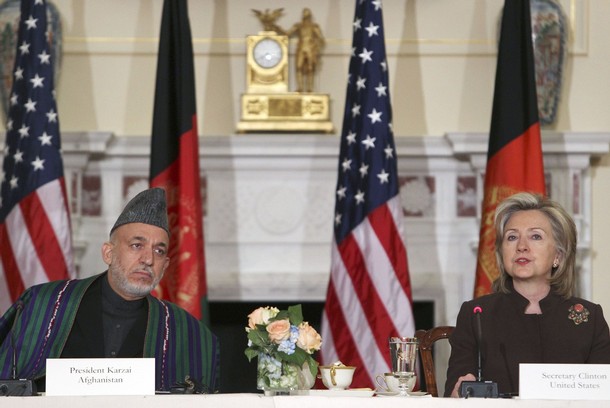
This week’s very visible visit of Afghan President Hamid Karzai to Washington, combined with the fallout from Faisal Shahzad’s failed bombing attempt in New York’s Times Square and the specter of forcing Pakistan to go after terrorist training camps in North Waziristan, raises the question of whether or not “we” can succeed in Afghanistan and Pakistan. The correct answer is a resounding no! “We,” meaning the United States and its allies alone, cannot succeed in bringing peace and security to the region.
The correct answer is whether or not Afghanistan and Pakistan under current leadership can prevail in the existential battles both are waging. Yet, for Afghan and Pakistani leadership to succeed, two potentially fatal contradictions in the Obama (and NATO) strategy must be overcome. And then the two governments must be up to the task of assuming broader responsibility for their security.
The announced U.S. aim in Afghanistan, accepted by NATO, has been to disrupt, disband and destroy al Qaeda and prevent its return. The means have been for U.S. and NATO forces to “hold, clear, build and transfer” responsibility to the Afghans. Because only a handful of al Qaeda operates in Afghanistan, the strategy has implicitly merged and combined al Qaeda with the Taliban. Hence, the focus of both military and “civilian” operations has been almost exclusively on disrupting, disbanding and destroying the Taliban.
Resolving the first contradiction is recognizing that despite September 11th al Qaeda is not and has not been the crux of the matter. The Pashtun populations are. An old Afghan expression reminds us that while all Taliban are Pashtuns, not all Pashtuns are Taliban. In simplest terms, to ensure al Qaeda and the Taliban are indeed rendered impotent and their threat minimized, unless or until the Pashtuns in both Afghanistan and Pakistan are enfranchised in some form, success will be elusive and probably impossible. Unfortunately, our strategy does not overtly recognize this contradiction although attempts at reconciliation and reintegration implicitly do.
In Afghanistan, the solutions are governance, governance and governance. Regarding transfer of responsibility, and despite hope and expectation, Afghanistan under Karzai has been incapable of providing the necessary governance to bring long-term stability. Here, the will and resolve of Karzai are essential. Despite promises by the Afghan president to those ends including a piece in Sunday’s Washington Post, the betting is at best 50/50 Karzai will be able to follow through on his pledges. Efforts to work around the president through reliance on strong cabinet ministers and local leaders, jirgas and strong men may not be the answer although they must be tried even at the expense of offending Karzai.
Much of the strategy depends on building Afghan security forces. The Afghan Army has gotten mixed reviews. The Afghan National Police however are a disaster. Advisors close to Karzai have recommended shutting the police down and starting afresh. It may be too late. Another avenue is open.
The ultimate approach may well be to contain violence within Afghanistan. That could lead to Afghanistan becoming a connected series of city states anchored around Kabul, Herat and Jalalabad for example protected by the army with parts of the country under the control of local strong men in some kind of cease fire or status quo arrangement provided Pashtun reconciliation can be settled. Clearly, this is not the ideal outcome. But there are far worse.
Pakistan, as the Obama administration has consistently and correctly argued, is the strategic center of gravity. Given the various foiled terrorist attacks in the U.S., great pressure is being placed on the Pakistani government to clean out training camps and insurgent bases in North Waziristan. If and when one of these terrorist attacks succeeds in the U.S., that pressure could become overpowering.
The fatal contradiction in our Pakistan strategy is that while the administration is absolutely right in its placement of the critical strategic importance of Pakistan, it has not provided the tools Pakistan needs to do the job either in righting its economy or giving its military the stuff it needs to defeat the insurgency. Critics of Pakistan and the administration will argue that the U.S. has provided plenty in military and economic aid and support. Unfortunately, compared with what has been spent in Iraq and Afghanistan, with populations a fifth or a sixth of Pakistan’s, those amounts have been minor—a reality unlikely to gain much sympathy or political traction here.
Two years ago, an Atlantic Council report warned: “Make no mistake. NATO is not winning in Afghanistan.” Today, that warning still applies. And, regardless of the U.S. and its NATO allies reconciling these strategic contradictions, only the governments in Kabul and Islamabad will answer the question of whether Afghanistan and Pakistan will succeed.
Harlan Ullman is an Atlantic Council Senior Advisor and chairman of the Killowen Group that advises leaders of government and business. This column was syndicated by UPI. Photo credit: Reuters Pictures.
Image: 610x_3.jpg
